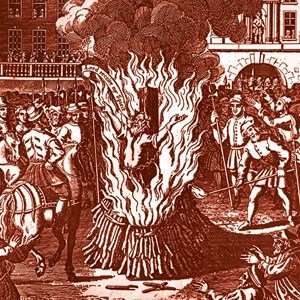The price of faith
The Burning Time: The Story of the Smithfield Martyrs

Smithfield, just beyond London’s western city walls, had long been a favoured spot for public executions but the pace quickened during the sixteenth century. Religious turmoil saw numerous victims of successive Tudor monarchs perish there: 48 in the reign of Mary I alone. Virginia Rounding provides a thorough, if rather exhausting, account of the casualties. She is sound, for the most part, on the historical context, but the tales of trials, interrogations and gruesome deaths have been told many times before.
Value can always be found, though, in the specifics. To take the Marian martyrs as an example, John Foxe worked very hard, in his Acts and Monuments of 1563, to produce a narrative populated by dastardly persecutors and heroic victims who all, crucially, gave their lives for more or less the same cause. Historians, aware that Foxe’s martyrology was a work of propaganda, have enjoyed poking holes in the accuracy of the reportage, but it’s every bit as interesting to spot the tensions and contradictions within the theological views of the various martyrs. Not even Foxe’s redactions could manage to contain the diversity. You’ll get a glimpse of this if you read Rounding’s book.
Similarly, she makes some effort to explore the era’s obsession with identifying true confessors (as opposed to devil-inspired pseudo-martyrs) and she delves into broader issues around the legitimacy of coercion in matters of faith. Welcome, too, is an attempt to provide a stronger narrative pulse by bringing two intriguing characters to centre stage. John Deane served at St Bartholomew’s in Smithfield through most of the “burning time” and provides an example of a “priest who wanted to stay out of trouble in these turbulent years”.
This was not an unreasonable ambition, and Reade is seen “quietly going about his pastoral work, spending time with friends and neighbours”, avoiding controversy and doing rather well in the property market.
Richard Rich also managed to sustain a successful career in the equally unstable world of Tudor high politics. He is most famous for his role in the destruction of John Fisher and Thomas More under Henry VIII and Rounding takes a measured view of his antics. Perhaps he tricked More into saying things that would go down badly with the Henrician regime, perhaps he made the whole thing up, or perhaps he embellished whatever conversation took place. In any event, Rich had an “unfailing instinct for survival” which may have trumped his “probable Catholic sympathies”. If survival is gifted to the fittest then, Rounding writes, men like Rich and Deane were fitter “than their less adaptable, if more obviously heroic, colleagues”.
Their stories also help this book but, while the prose is crisp and everything is perfectly entertaining, one struggles to locate a reason for travelling down these well-trodden historical paths without much in the way of fresh insights or discoveries. Perhaps sensing this, Rounding wonders if the stories of the Smithfield martyrs have relevance in the modern world. “Is there anything we can learn from this dark period in our history to help bring an end to today’s deathly religious conflicts?” I suppose the question is worth asking but, as Rounding wisely concedes, any parallels are perilous.
Virginia Rounding, (Macmillan, 480 PP, £20), Tablet bookshop price £18 • tel 01420 592974


 Votes : 0
Votes : 0









